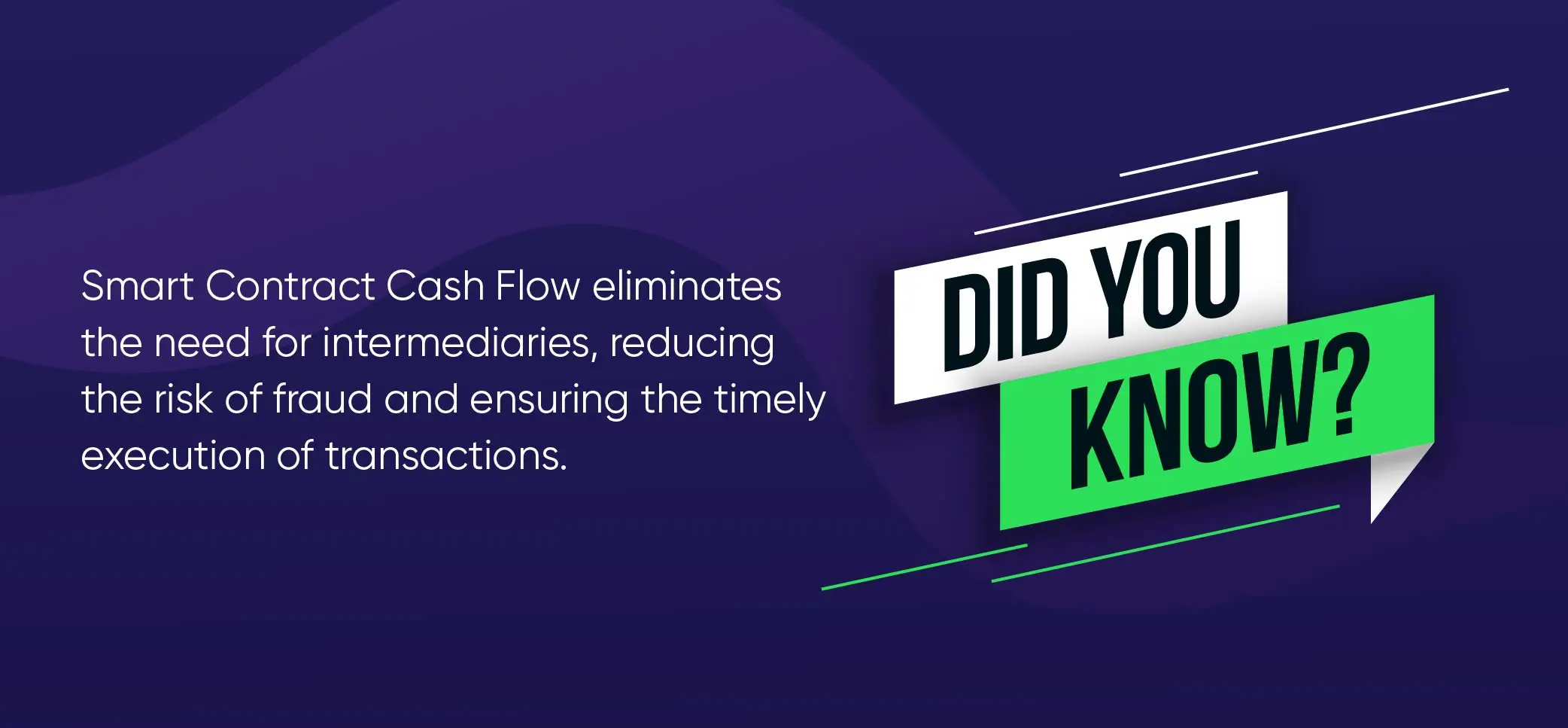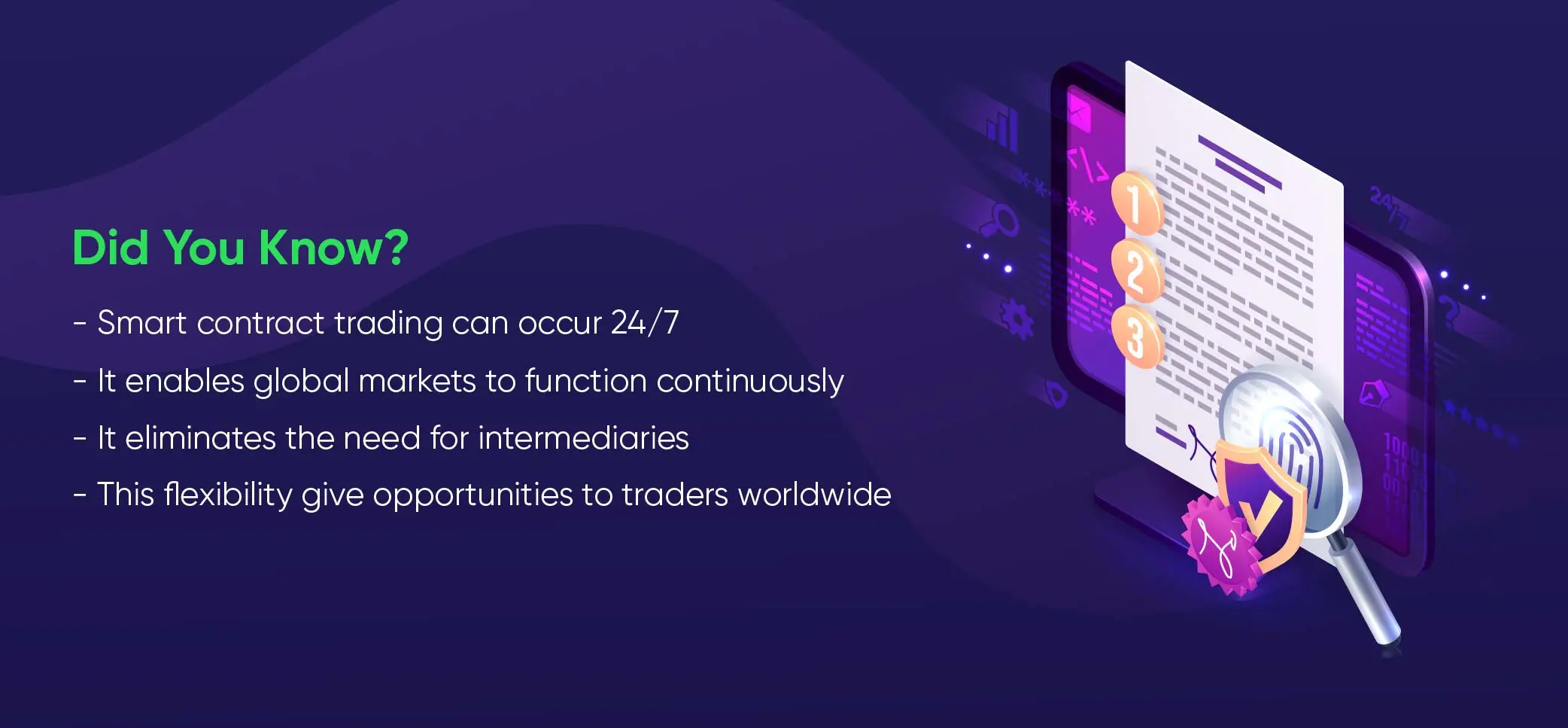
Introduction
Blockchain & Web3 Services Trusted By Leaders
- Develop innovative solutions using our state-of-the-art blockchain expertise.
- Achieve accelerated growth with robust & scalable Web3 consulting.
- Unlock 360-degree security with our top-rated blockchain development.
Smart Contract Cash Flow: What is it & How it Work?
Smart contracts have become an important aspect of the blockchain ecosystem. These contracts are transforming the way transactions are conducted and streamlining various processes. In this article, we’ll explore the concept of “Smart Contract Cash Flow” and go deep into how smart contracts work, their role in trading, and provide some real-world examples. Along the way, we’ll also share interesting facts and comparisons to help you better understand this subject. Let’s start;What is Smart Contract Cash Flow?
Smart Contract Cash Flow refers to the flow of funds within a smart contract, a self-executing, digital agreement that automatically enforces the terms of a contract when predefined conditions are met. These contracts use cryptocurrencies or tokens as a medium for transferring value, making the cash flow seamless, transparent, and automated.
Significance of Smart Contract
The qualities of a smart contract being a self-executing, impenetrable contract that runs on a blockchain and has the ability to automatically enforce its terms and conditions when certain predetermined conditions are met make it significant technology. Smart contracts, as opposed to traditional contracts, enable transparent, safe, and effective transactions by doing away with the need for middlemen. Due to the fact that these contracts are written in a programming language and implemented on a blockchain network, where they run automatically when the predetermined conditions are met without the need for human intervention. Smart contracts are revolutionizing the way agreements and transactions are carried out in the digital age. They find applications in a variety of fields, including finance, real estate, supply chain management, and more.How do Smart Contracts Work?
Blockchain technology’s main component, smart contracts, has an amazing balance of openness and efficiency. We will examine smart contracts’ internal workings in more detail in this section so that you can see how they operate and the range of industries in which they are used. To read in more detail, you should visit, what is blockchain smart contract and how it works.The Inner Workings of Smart Contracts
Smart contracts are self-executing digital agreements that run on blockchain technology. They are made up of code that clearly states the terms and conditions of a contract. The smart contract operates autonomously to enforce the terms of the agreement when predetermined conditions are met.- Initialization: The parties’ agreement is the first step in a smart contract’s journey. They agree upon the terms and conditions that will control their transaction as a group. This could include anything from the transfer of assets or services to the trading of cryptocurrency tokens.
- Coding: With the terms and conditions established, the smart contract is then meticulously coded using a specific programming language. The code serves as the contract’s digital blueprint, specifying how it should behave under various circumstances. Notably, once coded, the contract remains unchangeable, guaranteeing its immutability and integrity.
- Deployment: Once the coding is finished, a blockchain network is used to implement the smart contract. The infrastructure required for the contract to function is provided by the blockchain, which acts as the platform for its operation. Transparency is ensured by the contract’s visibility to all blockchain users after it is deployed.
- Execution: When the predetermined criteria are satisfied, the magic of smart contracts begins. These prerequisites could be as straightforward as a date or as intricate as the result of an outside event like the stock price hitting a particular level. The contract automatically self-executes, following its code’s instructions when the requirements are met. For example, in the context of supply chain management, the contract may automatically release payment to the supplier upon the shipment’s arrival at its destination.
The Role of Smart Contracts in Trading
Smart contracts have effectively integrated blockchain technology into the financial markets, providing a new era of trading.Benefits of Smart Contract Trading
Smart contracts provide numerous benefits to the trading sector that play an important role in making it more efficient, transparent, and secure. Here’s a closer look at these advantages:- Transparency: Decentralized ledger technology underpins smart contract operations, guaranteeing total transparency. Every agreement and transaction is documented on the blockchain and accessible to all parties. The possibility of fraud, manipulation, and disputes is decreased by this transparency. By enabling traders to confirm transaction histories and terms of agreements, the system is made more trustworthy.
- Security: The security of smart contracts is paramount. Once deployed on the blockchain, they become tamper-proof and resistant to unauthorized changes. This eliminates the risk of fraudulent activities or unauthorized alterations to the terms. Assets held in smart contracts are safeguarded by the blockchain’s robust encryption and consensus mechanisms.
- Efficiency: Intermediaries like brokers and clearinghouses are frequently used in traditional trading, which can cause delays and additional expenses. Conversely, smart contracts function independently and carry out transactions when certain criteria are satisfied. Due to almost immediate settlement, trading takes place with less effort and expense.
Smart Contracts in Action
Smart contracts do not have a specific asset class but find applications in various trading parts:- Cryptocurrency Trading: The prominent use cases of smart contracts are in cryptocurrency trading like decentralized exchanges (DEXs) that leverage smart contracts to enable users to trade cryptocurrencies directly with each other, eliminating the need for a centralized intermediary. In addition, these exchanges are operational around the clock, providing a seamless trading experience for participants in different time zones.
- Tokenized Assets: Smart contracts are employed in the trading of tokenized assets, including stocks, real estate, and commodities. These assets are represented as digital tokens on the blockchain, and smart contracts facilitate the trading, ownership transfer, and settlement of these assets.
 Whether it’s the trading of cryptocurrencies or traditional assets, the adoption of smart contracts and smart contract development is set to enhance the trading experience for both retail and institutional traders alike.
Whether it’s the trading of cryptocurrencies or traditional assets, the adoption of smart contracts and smart contract development is set to enhance the trading experience for both retail and institutional traders alike.
Real-World Examples of Smart Contracts
Smart contracts are making a tangible impact but how? Let’s explore some real-world examples that demonstrate their versatility and transformative power.- Ethereum’s ICO contracts are a popular application of smart contracts for raising capital in blockchain projects or cryptocurrency startups. Investors receive tokens in exchange for their contributions, which are distributed automatically by the smart contract, ensuring transparency, reducing human error, and eliminating middlemen.
- Decentralized Exchanges (DEXs) are cryptocurrency trading platforms that use smart contracts to facilitate transactions between users. These platforms hold assets in escrow, validate trade conditions, and execute trades, eliminating intermediaries, enhancing security, and reducing trading fees.
Smart Contract Industrial Use Cases
Beyond ICOs and DEXs, smart contracts have more applications in various other sectors:- Supply Chain Management: Smart contracts are used to trace the movement of goods from manufacturers to consumers. They can automatically update inventory, validate the authenticity of products, and trigger payments upon successful deliveries.
- Insurance: Smart contracts are being employed to automate the insurance claim process. When predefined conditions are met (e.g., in the case of a flight delay or a weather-related event), the smart contract can trigger the payout of the insurance claim without requiring manual approval.
- Real Estate: In the real estate industry, smart contracts facilitate property transactions. They can manage escrow, automate property transfers, and securely record ownership on the blockchain.
- Governance: Some blockchain-based projects and organizations use smart contracts for decentralized governance. Token holders can vote on proposals, and the outcomes are executed through smart contracts, ensuring a fair and transparent decision-making process.
A Comparison Table: Smart Contracts vs. Traditional Contracts
Let’s compare smart contracts and traditional contracts to highlight their differences: AspectSmart ContractsTraditional Contracts
Automation |
Self-executing | Manual |
Intermediaries |
Few to none |
Often required |
Execution Time |
Immediate |
Manual, May take time |
Cost Efficiency |
Cost-effective |
Costly |
Transparency |
High |
Limited |
Final Note
On a final note, we can say that Smart Contract Cash Flow has combined the efficiency and transparency of smart contracts. Because of this combination of two features, smart contract cash flow is reshaping financial transactions and agreements conduction. Whether you’re an investor, developer, enterprise owner, businessman, or blockchain enthusiast, understanding these concepts is really important in navigating the evolving world of blockchain technology. If you are looking for smart contract development for your company, BloxBytes, a top-notch blockchain development service provider has a team of smart contract developers that have prior knowledge of protocols, blockchain network selection, and executing the requirements of the clients as per their business goals.Follow BloxBytes Journal for more insights!